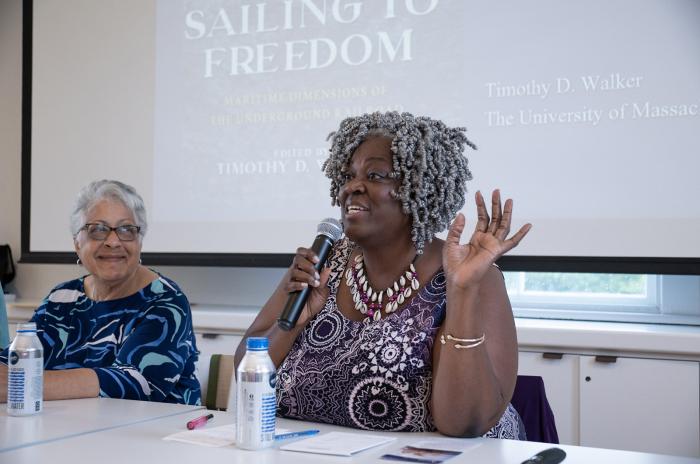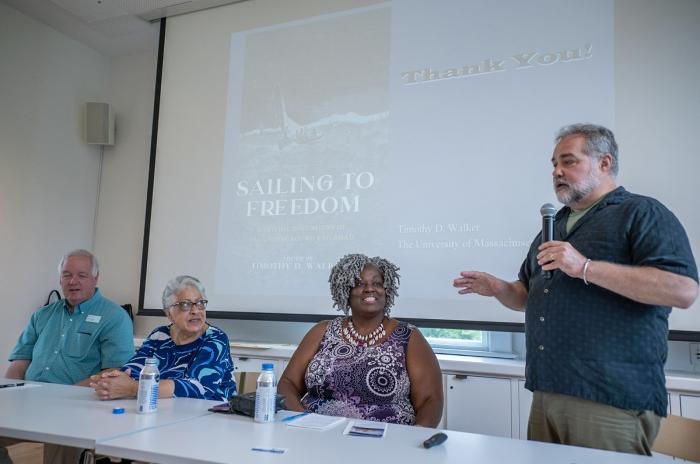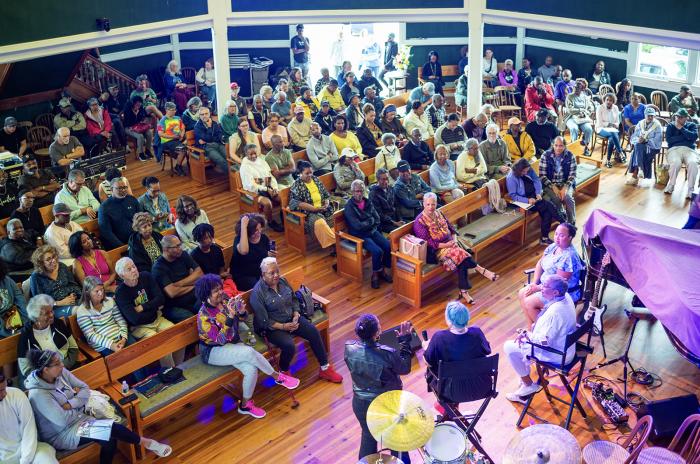Undeterred by the rain on Saturday, visitors made their way to Tisbury wharf to tour the historic Amistad, a replica of the historic vessel that was the setting of a slave revolt in 1839. The ship is the centerpiece for the holiday weekend remembering and celebrating Juneteenth.
Eric Depradine said he had been trying to visit the ship since November, having missed it in New Haven, Conn and again at the Mystic Seaport Museum, where it is typically docked. Determined not to miss another opportunity, Mr. Depradine booked his first trip to the Vineyard from Norwich, Conn.
“This is an incredible floating museum,” Mr. Depradine said on Saturday. “Since there is a concerted effort in our country to minimize certain aspects of our national history, it is even more important to have these museums to go to different places on our coastline and tell this story from the 1830s because we still have some parts of this history that affect us today.”
Other visitors pointed to the importance of remembering all aspects of the past.
“It’s great to remind New England that it was part of the slave trade,” said Susan Seger, whose family began spending summers on the Vineyard in the 1860s. “Especially because this story is about African Americans and their freedom, not about how white people gave them freedom, which is usually the story told here.”
Just up the road, perched on a hill overlooking the harbor, the Martha’s Vineyard Museum hosted a panel discussion. The talk was moderated by museum board member Shelley Stewart and featured a lecture on the maritime Underground Railroad by Dr. Timothy Walker, author of Sailing to Freedom. Mr. Walker was joined by Dr. Lee Blake, president of the New Bedford Historical Society, Bow Van Riper, the research librarian at the museum, and Paula Mann-Agnew, executive director of Discovering Amistad.
Mr. Walker’s lecture and the conversation with his fellow panelists acknowledged that the story they told is an uncommon narrative.
“This story puts the agency of escape squarely on the shoulders of the enslaved,” Mr. Walker said. “This is not a story of white people helping the enslaved on the Underground Railroad.”
Ms. Blake explained that stories such as Juneteenth and the slave revolt aboard the Amistad are not typically central to the conversation in the United States but are essential.

Paula Mann-Agnew, executive director of Discovering Amistad, at a panel discussion at the Martha’s Vineyard Museum.
— Jeanna Shepard
“We need to teach this history and when we do we are keeping alive the stories of our family members,” Ms. Blake said. “We as individuals carry the responsibility of teaching this so that our children learn this history.”
Audience member Carissa Foreman made the trip to the Island from her home in New York City when she learned about the Juneteenth Jubilee. She said she was drawn to the panel discussion for its focus on the unfamiliar story of maritime escape.
“I was interested to hear these stories told not from a victim standpoint,” Ms. Foreman said. “These were very intelligent people who were extremely capable, and choosing to bring themselves and others to freedom was a very courageous activity…. We hear so much about Harriet Tubman and the Underground Railroad, but we never learn about the captains and all the people in each of these port towns who were bringing others to freedom.”
Rosemary O’Brien said she did not know a lot about the history of Juneteenth and appreciated the breadth of knowledge and variety of perspectives shared by panelists.
“As a person of Irish descent, I don’t understand this history and need to,” Ms. O’Brien said. “I live here in the summer and I just had no idea about any of the history happening right here. It’s amazing that we had the opportunity to hear from these experts. They each had their unique perspective.”
Perry Watson III also felt he had learned something new and was now eager to act. Mr. Watson works for The HistoryMakers, an educational archive that preserves and distributes stories of well-known and not well-known African Americans.
“I didn’t know anything about the maritime Underground Railroad so I’ve got to spread the word,” Mr. Watson said. “Our history is so under-recorded that we’re always discovering something new through research.”
During the panel discussion, Ms. Mann-Agnew gestured out the window to the Amistad docked at Tisbury Wharf.
“When we learn about the Amistad, many of us are just learning about it,” Ms. Mann-Agnew said. “We all need to relearn about it because our history is distorted and whitewashed… We call this a voyage for freedom and our voyage for freedom is still going because we still aren’t there, by the way.”
Events on Saturday also took place in Oak Buffs, including the second annual Juneteenth Jubilee Cultural Festival. The event was originally scheduled for the Tabernacle but was relocated a few streets away to Union Chapel.
The program began with introductions by one of the event’s organizers, Kahina Van Dyke, Oak Bluffs police chief Jonathan Searle, and president of the NAACP of Martha’s Vineyard, Toni Kauffman.
Ms. Kauffman talked about the importance of the Vineyard as a neighborhood.
“In America, things are widespread and you see things in a broader sense. But as we are here, on the Vineyard, there is a heightened sense of the things that are going on,” Ms. Kauffman said. “We know each other.”
Ms. Van Dyke opened with a history lesson on The Cottagers, Inc. an all-female philanthropic group based in Oak Bluffs. Ms. Van Dyke asked the Cottagers in the crowd to stand up and be acknowledged.
The featured speaker was Nikole Hannah-Jones, the Pulitzer Prize-winning journalist who created The 1619 Project for the New York Times which traced slavery’s role in America. Ms. Hannah-Jones focused on the importance of engaging with history in its fullest form. She said that learning about history without race involved is like learning about a country that “never really existed.”
The last part of the afternoon was all about the music, kicking off with a community sing of Lift Every Voice and America the Beautiful.
For a long-time Oak Bluffs resident, Marie Doubleday, it was Grace Gibson who took her breath away.
“She’s just off the hook,” Ms. Doubleday said, adding that Ms. Gibson reminded her of the music she heard as a child.
Tours of the Amistad continue Sunday, along with Juneteenth events which extend through Tuesday.






